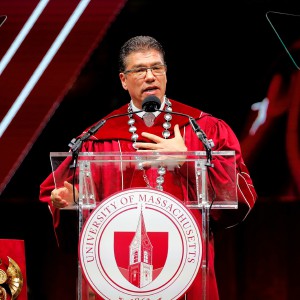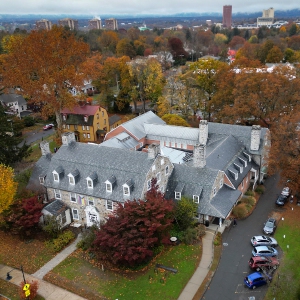Amherst’s new school project would bring tax hike of nearly $500 per year for average homeowner
| Published: 02-08-2023 7:39 PM |
AMHERST — An average Amherst homeowner could face a nearly $500 increase in their annual property tax bill should voters approve construction of a $98 million elementary school this spring.
Finance Director Sean Mangano on Monday presented the Town Council with a preliminary look at how the 105,750-square-foot, three-story building, planned for a fall 2026 opening at the Fort River School site on South East Street, would impact property tax bills for the next 30 years, with interest-only payments beginning in 2025 and then both principal and interest payments starting in 2029 and continuing until 2054.
According to a spreadsheet provided by Mangano, the school building would have a $1.07 per $1,000 valuation impact for all properties if residents approve a Proposition 2½ debt-exclusion override vote, likely to be on or around May 2. With the average single-family home this year assessed at $446,953, the school building project would mean a $478.24 annual tax increase for the typical homeowner.
The current tax rate of $20.10 per $1,000 valuation would rise to $21.17 per $1,000 valuation, increasing the average tax bill from $8,984 to $9,462.
The estimates are based on the town paying around $54 million toward the project, with the Massachusetts School Building Authority picking up most of the remaining costs. Mangano’s information also factors in the use of Community Preservation Act money for some eligible aspects of the project, such as playing fields, and rebates from Eversource related to various environmentally friendly aspects of the project, including solar arrays.
Mangano said the project costs, already down $10 million from a high of $108 million, could continue to change and won’t be fixed until the second half of 2024, when construction bids are received. Possible adjustments of the costs to the town include changing interest rates.
Mangano said commercial and residential development could also spread out the burden of the debt exclusion.
“If we have another period of growth like we’ve had the past five to seven years, I would expect those numbers to be quite a bit lower when we go out to borrow the money,” Mangano said.
Article continues after...
Yesterday's Most Read Articles
 Design Review Board in Amherst backs 5-story apartment project connected to old Hastings building
Design Review Board in Amherst backs 5-story apartment project connected to old Hastings building
 ‘Home away from home’: North Amherst Library officially dedicated, as anonymous donor of $1.7M revealed
‘Home away from home’: North Amherst Library officially dedicated, as anonymous donor of $1.7M revealed
 Connecticut man gets 8 years in Hadley shooting
Connecticut man gets 8 years in Hadley shooting
 Granby Bow and Gun Club says stray bullets that hit homes in Belchertown did not come from its range
Granby Bow and Gun Club says stray bullets that hit homes in Belchertown did not come from its range
 Charlene Galenski: Blake Gilmore, a strong candidate for Deerfield’s Selectboard
Charlene Galenski: Blake Gilmore, a strong candidate for Deerfield’s Selectboard
 Annette Pfannebecker: Vote yes for Shores Ness and for Deerfield
Annette Pfannebecker: Vote yes for Shores Ness and for Deerfield
Still, At-Large Councilor Ellisha Walker said the town has to look at ways to cut the burden of the projected property tax increase. She also said that while it’s great cost estimates have come down some, more should be done.
“Looking at any kind of increase is difficult for not only people who may live here already and have a hard time paying the taxes, but people who may want to move here,” Walker said. “I’m wondering and hoping we can explore further options for reducing that.”
District 1 Councilor Michele Miller said town leaders have to reduce the costs to taxpayers as much as possible. Miller asked if financial reserves can be directed to cover some of the expenses.
“I think that it’s important that the town shows its commitment to the project, but that we also try to reduce the burden to the taxpayer as much as possible,” she said.
Mangano said using reserves will be discussed by the Finance Committee, but that a financing plan for a new fire station in South Amherst and a new Department of Public Works headquarters, as well as the renovation and expansion of the Jones Library, already hinges on use of this money. He said the overall goal remains to complete four projects.
“Those reserves play a really critical role in some of the other projects,” Mangano said.
District 3 Councilor Dorothy Pam wondered if low-income seniors on fixed incomes who still live in their own homes could be helped in the event that they can’t afford the tax increase. Mangano said they would have to speak to the assessors office to see if they are getting all exemptions they are entitled to.
While the May 2 date for the vote is not official, it is the one most being discussed. Town Council members want to ensure that people understand when the vote is taking place, which is off cycle from the usual fall elections in odd years.
Councilors suggested they would like to see a week of early voting in the lead-up to the election, including some hours in the evening, and at least one day on the University of Massachusetts campus, a way of ensuring that both students and faculty and staff who live in Amherst would have a nearby place to vote.
Whether Town Clerk Susan Audette will adopt those suggestions is unclear. Audette said that since mail-in ballots have been part of the voting process in Massachusetts, in-person early voting has declined. She also said that just 2% of registered voters are based at UMass, and that because the school vote is not a state election, holding voting there would be an unfunded mandate.
“I will continue to explore,” Audette said.

 Sharing a few notes: High schoolers coaching younger string players one on one
Sharing a few notes: High schoolers coaching younger string players one on one Reyes takes helm of UMass flagship amid pro-Palestinian protests
Reyes takes helm of UMass flagship amid pro-Palestinian protests Sole over-budget bid could doom Jones Library expansion project
Sole over-budget bid could doom Jones Library expansion project Amherst poised to hire police department veteran as new chief
Amherst poised to hire police department veteran as new chief 